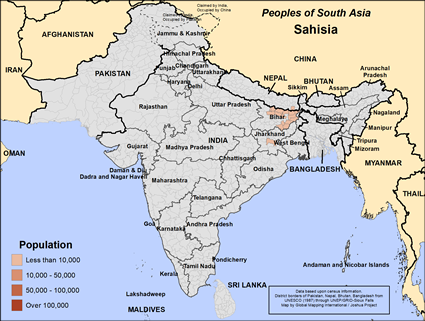Sahisia in India

Send Joshua Project a photo
of this people group. |

Map Source:
People Group data: Omid. Map geography: UNESCO / GMI. Map Design: Joshua Project
|
| People Name: | Sahisia |
| Country: | India |
| 10/40 Window: | Yes |
| Population: | 8,800 |
| World Population: | 8,800 |
| Primary Language: | Urdu |
| Primary Religion: | Islam |
| Christian Adherents: | 0.00 % |
| Evangelicals: | 0.00 % |
| Scripture: | Complete Bible |
| Ministry Resources: | Yes |
| Jesus Film: | Yes |
| Audio Recordings: | Yes |
| People Cluster: | South Asia Muslim - other |
| Affinity Bloc: | South Asian Peoples |
| Progress Level: |
|
Introduction / History
The Urdu-speaking Muslim Sahisia people live in Bihar, India. Historically, the Sahisia have been involved in various trades and occupations, including agriculture, small-scale business and manual labor. Over time, they have adapted to the economic challenges in Bihar while maintaining their cultural and religious practices. Despite facing economic difficulties, many Sahisia families continue to rely on traditional occupations for their livelihoods.
What Are Their Lives Like?
The Sahisia people primarily work in agriculture, growing crops like rice, wheat and vegetables. Some families also engage in small-scale trade or work as laborers in local industries. The community often works together, with family members contributing to farming or other income-generating activities. In rural areas, the Sahisia people live in villages where extended families provide mutual support, sharing resources and responsibilities.
Many Sahisia homes are built using locally sourced materials such as mud, brick and thatch. Life in their villages revolves around farming, family obligations and religious activities. While some younger members of the Sahisia community seek education and employment in nearby towns and cities, most remain closely connected to their rural roots and traditional ways of life.
What Are Their Beliefs?
The Sahisia people practice Sunni Islam. They observe the five pillars of Islam, including daily prayers, fasting during Ramadan and giving to charity. Religious festivals like Eid al-Fitr and Eid al-Adha hold great importance in their community, bringing families together for prayers, feasts and celebrations.
Mosques serve as central places of worship and community gatherings. Religious leaders provide guidance on spiritual matters and play a significant role in maintaining social order within the community. The Sahisia people's religious practices deeply influence their daily lives, shaping both their personal and communal interactions.
What Are Their Needs?
The Sahisia people face several challenges related to economic development, education and healthcare. Many families still rely on traditional farming methods, making them vulnerable to changes in climate and market fluctuations. Access to modern farming tools, irrigation systems and training in sustainable agricultural practices would improve their economic stability.
Education remains a critical need for the Sahisia community. In rural areas, schools are often under-resourced, limiting the opportunities available to Sahisia children. Expanding access to quality education and improving school infrastructure would help the younger generation pursue diverse career paths and improve their living conditions.
Healthcare services are also limited, with families often traveling long distances to access basic medical care. Improving healthcare infrastructure and providing more accessible services would enhance the well-being of the Sahisia community.
Prayer Points
Pray for the Lord to raise up a strong movement to Christ to saturate the hearts and minds of the Sahisia people.
Pray for God's blessing, strengthening and healing of Sahisia families and communities within this people group through the abundant life Jesus offers to all who call on his name.
Pray for God's blessing on the leaders in this people group, along with their families and for their communities to welcome and enjoy God's blessing.
Pray for the Lord to multiply the reception and influence of his word among this people group, leading them to love him with their whole being.